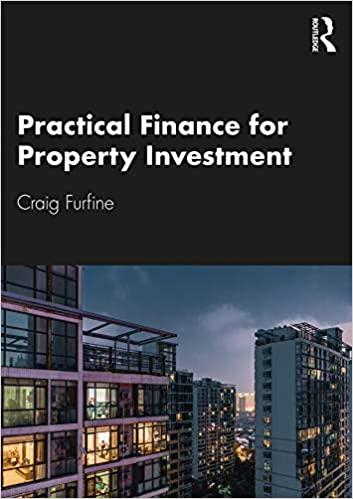Question 5: MCQ based on Case scenario: JOHN AND APRIL (5 marks) John and April have been referred to you by one of your best
Question 5: MCQ based on Case scenario: JOHN AND APRIL (5 marks)
John and April have been referred to you by one of your best clients for help with their financial affairs. John is self-employed as a Massage Therapist and April is a teacher. They are not married. John is 41 years old and has just recently graduated as an RMT. He is building his practice and is surprised by how fast it is growing. He has been in practice for two and a half years and is paying himself a salary of $50,000 per year. April is 35 and has been working as a teacher for the past 12 years. They have one child, Samuel, who just turned a year old. April earns a salary of $65,000 with summers off. John was married before he met April. He was married for two years but had no children. He now pays his former wife a spousal support of $800 per month. John and April have been living in an apartment while they save for a house for the last 6 years. They are paying a rent of $1,200 a month. They are looking to buy a house soon. Another family issue that a house would solve would be to allow April's mother Sarah to move in with them. Sarah just turned 63 and is thinking of retiring. Her savings consist of $125,000 invested in GIC's earning 4%; she has no pension and will likely be relying on government pensions to live. John and April are concerned that Sarah will not have enough to live on, given that government pensions do not provide much in the way of income. Sarah has lived in Canada all her life and has always worked. She is in very good health. John and April both have small RRSPs that are invested in GICs at their local bank. John has about $10,000 and April has $15,000. April also has a pension through the teacher's association. Her last PA was $3,500 and the commuted value of the pension was $35,000 on her last statement. John and April have been increasingly concerned with the low rates on GICs at renewal time. They have felt for some time that they needed to do something so John and April saw another Financial Planner a few months ago but found him too pushy. They tell you that he wanted them to sign a contract without reading it and that they felt pressured to buy that day without really understanding the information they were given. The pushy planner had told them that if they did not start investing the same day, they would not have enough time to save all the money they would need. He told them that they would need to have savings of $500,000 by the time they retire, assuming they both wanted to retire when John is 65. John & April had told him that they both expected to live 25 years in retirement and that they would need $55,000 (in ffuture dollars) per year excluding all savings to date.
Questions: (5 *1 mark each)
Q.1 If Sarah decides to retire today, which of the following would be true regarding the government benefits she could expect right away:
a. 85.6% of her CPP entitlement, no OAS and no GIS.
b. 88% of her CPP entitlement, no OAS, and no GIS.
c. 88% of her CPP entitlement, all her OAS but no GIS.
d. 94% of her CPP entitlement, all her OAS, but no GIS.
Q.2 John and April would like to know how much they can each contribute to their RRSPs annually, exclusive of any carry forward room:
a. $9,000 John; $11,700 April.
b. $9,000 John; $8,200 April.
c. $7,272 John; $8,200 April.
d. $7,272 John; $11,700 April.
Q.3 April is thinking of contributing some of her nonregistered assets to her RRSP. Which of the following is true regarding property transferred to an RRSP?
a. Capital gains (on transferred assets) must be claimed but capital losses may not be claimed.
b. Applicable gains and losses must be claimed in the year the property is contributed to the RRSP.
c. For fixed income securities, capital gains must be claimed but accrued interest does not need to be claimed.
d. For fixed income securities, accrued interest must be claimed, but not capital gains.
Q.4 If John became disabled due to an automobile accident for 3 months or less, what would his current options be:
a. To apply for CPP disability insurance.
b. To utilize savings on hand, including RRSPs.
c. To apply for Workman's Compensation.
d. To apply for accident benefits under April's benefits.
Q.5 What interest rate did the pushy financial planner assume, to predict their retirement income requirements? a. 9.98% b. 11.44% c. 10.26% d. 9.07%
Step by Step Solution
There are 3 Steps involved in it
Step: 1

See step-by-step solutions with expert insights and AI powered tools for academic success
Step: 2

Step: 3

Ace Your Homework with AI
Get the answers you need in no time with our AI-driven, step-by-step assistance
Get Started


